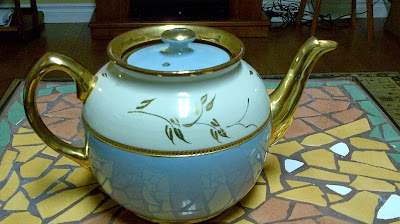 |
| For Sale: 25 cents Or Best Offer |
Sunday morning. Town's quiet. Our B & B guests are getting acquainted over omelets and toast.
When God declared a Sabbath for rest
from our labours, I don't think he had in mind the rigours of garage
sales and soccer.
Rosthern's population doubled on
Saturday. The under-8s and under-10s soccer tournament brought in 600
kids along with parents and brothers and sisters. We and about a
dozen other residents had determined that it would be a great weekend
for garage sales and some of our customers had made a day of it. Two
office chairs went to the Prud'homme Library, for instance, carried
back home by a soccer mom.
I'm not sure what's behind the impulse
to frequent garage sales. It's apparent to me that some (hoarders
maybe?) come out with a few dollars and a hope that they'll be able to fill
their trunks with neat stuff for next to nothing. Some are looking for
treasure and some actually need items that are bound to appear once
in a while at a good price.
Others, I'm convinced, are voyeurs;
garage sales give them an opportunity to snoop into private lives.
It's obviously a simple diversion for others: the Garage Sailors.
I remember driving through Somerset
county on a leisurely Sunday and seeing a “Boot Sale” sign
pointing toward a meadow with cars parked in two rows. “Need
boots?” I asked Agnes, but it was curiosity that made us turn off.
The cars had their “boots” open, of course, from which they were
selling, well, the same kind of stuff we sell at garage sales.
Another version of the flea market, a
concept older than Dickens.
We live in an age where recycling,
reducing and reusing are taken for granted. Our landfill sites are
bursting with our 'stuff' and our resources are depleting. To see a
table we can no longer use go to someone for whom “it's perfect!”
provides some satisfaction, even if the item cost $300.00 and you're
selling it for $50.00. And the office chairs will do well for
Prud'homme's library, especially since, like all libraries, they're
starved for cash.
A young boy—probably about 12—picked
out a book for which he paid $0.50; it was a very old German,
Mennonite hymnbook. I didn't get that. Maybe he liked the smell or
the heft of it.
Another man said he'd decided to spend
$5.00 but so far had only reached $4.00. He was looking for another
$1.00 item to add to his cache. I didn't get that either. We had
plenty of change.
Anyway, meeting people has to be the
highlight of sitting on your driveway for two days like children with
a hopeful lemonade stand. The 8-year old soccer stars in their
cleats and knee socks cuddling the stuffed animals with which our
kids used to play, well, that's priceless.
Murphy's Law of Soccer and Garage Sales reads as follows: Put on a garage sale or tournament and
clouds will gather, the temperature will drop and the wind will pick
up. The forecast for the Sunday after: sunny with a light breeze and
seasonal temperatures.
I
think we sold a few blankets to moms watching the soccer from the
sidelines.


 “Spaghetti straps. Ultra-short skirts. Excessive cleavage.
Midriff-baring tops. Shorts with a hem shorter than where a person's
fingertips graze when they are standing.”
“Spaghetti straps. Ultra-short skirts. Excessive cleavage.
Midriff-baring tops. Shorts with a hem shorter than where a person's
fingertips graze when they are standing.”









